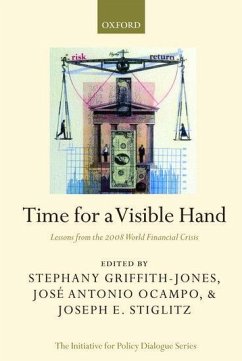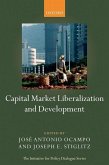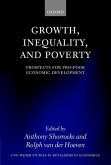Time for a Visible Hand
Lessons from the 2008 World Financial Crisis
Herausgeber: Griffith-Jones, Stephany; Stiglitz, Joseph E; Ocampo, José Antonio
Schade – dieser Artikel ist leider ausverkauft. Sobald wir wissen, ob und wann der Artikel wieder verfügbar ist, informieren wir Sie an dieser Stelle.
Time for a Visible Hand
Lessons from the 2008 World Financial Crisis
Herausgeber: Griffith-Jones, Stephany; Stiglitz, Joseph E; Ocampo, José Antonio
- Gebundenes Buch
- Merkliste
- Auf die Merkliste
- Bewerten Bewerten
- Teilen
- Produkt teilen
- Produkterinnerung
- Produkterinnerung
The book addresses the 2008 financial crisis originating in developed countries that will have a major impact on developing countries, as it spreads globally. It discusses the underlying reasons behind the crisis and suggests solutions that can help prevent such a crisis in the future.
Andere Kunden interessierten sich auch für
![Hand-Book of Punctuation, With Instructions for Capitalization, Letter-writing, and Proof-reading Hand-Book of Punctuation, With Instructions for Capitalization, Letter-writing, and Proof-reading]() William Joynson CockerHand-Book of Punctuation, With Instructions for Capitalization, Letter-writing, and Proof-reading32,99 €
William Joynson CockerHand-Book of Punctuation, With Instructions for Capitalization, Letter-writing, and Proof-reading32,99 €![Capital Market Liberalization and Development Capital Market Liberalization and Development]() José Antonio Ocampo / Joseph E. Stiglitz (ed.)Capital Market Liberalization and Development185,99 €
José Antonio Ocampo / Joseph E. Stiglitz (ed.)Capital Market Liberalization and Development185,99 €![Internationalization and Economic Institutions Internationalization and Economic Institutions]() Mark ThatcherInternationalization and Economic Institutions183,99 €
Mark ThatcherInternationalization and Economic Institutions183,99 €![Inequality and the State Inequality and the State]() John HillsInequality and the State85,99 €
John HillsInequality and the State85,99 €![An Agenda for a Growing Europe An Agenda for a Growing Europe]() Josi ViqalsAn Agenda for a Growing Europe198,99 €
Josi ViqalsAn Agenda for a Growing Europe198,99 €![Family Business Family Business]() Julie HardwickFamily Business136,99 €
Julie HardwickFamily Business136,99 €![Growth, Inequality, and Poverty Growth, Inequality, and Poverty]() Rolph HoevenGrowth, Inequality, and Poverty98,99 €
Rolph HoevenGrowth, Inequality, and Poverty98,99 €-
-
-
The book addresses the 2008 financial crisis originating in developed countries that will have a major impact on developing countries, as it spreads globally. It discusses the underlying reasons behind the crisis and suggests solutions that can help prevent such a crisis in the future.
Produktdetails
- Produktdetails
- Verlag: Oxford University Press, USA
- Seitenzahl: 376
- Erscheinungstermin: 12. März 2010
- Englisch
- Abmessung: 236mm x 160mm x 23mm
- Gewicht: 590g
- ISBN-13: 9780199578801
- ISBN-10: 019957880X
- Artikelnr.: 27234074
- Herstellerkennzeichnung
- Libri GmbH
- Europaallee 1
- 36244 Bad Hersfeld
- gpsr@libri.de
- Verlag: Oxford University Press, USA
- Seitenzahl: 376
- Erscheinungstermin: 12. März 2010
- Englisch
- Abmessung: 236mm x 160mm x 23mm
- Gewicht: 590g
- ISBN-13: 9780199578801
- ISBN-10: 019957880X
- Artikelnr.: 27234074
- Herstellerkennzeichnung
- Libri GmbH
- Europaallee 1
- 36244 Bad Hersfeld
- gpsr@libri.de
Stephany Griffith-Jones is an economist whose areas of expertise include global capital flows to emerging markets and international financial reform. Prior to joining IPD, Professor Griffith-Jones was Professorial Fellow at the Institute of Development Studies at University of Sussex and served as Senior Official at the United Nations Department of Economic and Social Affairs and the Economic Commission of Latin America (ECLAC), and as Head of International Finance at the Commonwealth Secretariat. She has acted as senior consultant to governments in Eastern Europe and Latin America and to many international agencies, including the World Bank and United Nations. She began her career at the Central Bank of Chile. She has published many articles and books including International Finance and Development with Jose Antonio Ocampo and Jan Kregel. She received the Association of Latin American Financial Institutions prize for best essay on Latin America's international finance. José Antonio Ocampo is Professor in the School of International and Public Affairs and Fellow of the Committee on Global Thought at Columbia University. Prioir to this, Professor Ocampo served as the United Nations Under-Secretary-General for Economic and Social Affairs, and head of UN Department of Economic and Social Affairs (DESA), as Executive Secretary of the UN Economic Commission for Latin America and the Caribbean (ECLAC), and has held a number of high-level posts in the Government of Colombia, including Minister of Finance and Public Credit and Director of the National Planning Department. He has also served as Executive Director of FEDESARROLLO, the main think tank on economic issues in Colombia, Director of the Centro de Estudios sobre Desarrollo Economico of Universidad de los Andes, Professor of Economics at Universidad de los Andes, and Professor of Economic History at Universidad Nacional de Colombia. He has also been Visiting Professor at Cambridge, Oxford and Yale Universities. Joseph E. Stiglitz holds joint professorships at Columbia University's Economics Department and its Business School. He is co-chair of IPD's macroeconomics, CML, and Intellectual Property Task Forces. From 1997 to 2000 he was the World Bank's Senior Vice President for Development Economics and Chief Economist. From 1995- 97 he served as Chairman of the U.S. Council of Economic Advisers and as a member of President Clinton's cabinet. From 1993 to 1995 he was a member of the Council of Economic Advisers. He was previously a professor of economics at Stanford, Princeton, Yale, and All Souls College. Dr Stiglitz is a leading scholar of the economics of the public sector and was awarded the Nobel Prize in Economics in 2001 in addition to the American Economic Association's biennial John Bates Clark Award in 1979. His work has been recognized through his election as a fellow to the National Academy of Sciences, the American Academy of Arts and Sciences, the Econometric Society, and the British Academy.
* 1: Stephany Griffith-Jones, Jose Antonio Ocampo, and Joseph E.
Stiglitz: Introduction
* Part I: The Crisis in the United States
* 2: Joseph E. Stiglitz: The Financial Crisis of 2007-2008 and its
Macroeconomic Consequences
* 3: Gerald Caprio, Jr.: Subprime Finance: Yes, We are Still in Kansas
* 4: Jan Kregel: Background Considerations to a Re-regulation of the
U.S. Financial System: Third time a Charm? Or Strike Three?
* 5: Joseph E. Stiglitz: Responding to the Crisis
* Part II: Reforming Financial Regulation
* 6: Philip Turner: Central Banks, Liquidity and the Banking Crisis
* 7: Jane d'Arista and Stephany Griffith-Jones: Agenda and Criteria for
Financial Regulatory Reform
* 8: Avinash D. Persaud: The Role of Policy and Banking Supervision in
the Light of the Credit Crisis
* 9: C.A.E. Goodhart: How, If at All, should Credit Rating Agencies
(CRAs) be Regulated?
* 10: Perry Mehrling: Credit Default Swaps (CDSs): The Keys to
Financial Reform
* 11: Marion Williams: Governing the Regulatory System
* Part III: Developing Country Perspectives
* 12: Yilmaz Akyüz: The Management of Capital Flows and Financial
Vulnerability in Asia
* 13: Y.V. Reddy: Regulation of Financial Sector in Developing
Countries: Lessons from the 2008 Financial Crisis
* 14: Roberto Frenkel and Martin Rapetti: Economic Development and the
International Financial System
* 15: Fernando J. Cardim de Carvalho: The Accumulation of International
Reserves as a Defense Strategy
* Part IV: Reforming the Global Monetary System
* 16: José Antonio Ocampo: Reforming the Global Reserve System
* 17: Bruce Greenwald and Joseph E. Stiglitz: A Modest Proposal for
International Monetary Reform
Stiglitz: Introduction
* Part I: The Crisis in the United States
* 2: Joseph E. Stiglitz: The Financial Crisis of 2007-2008 and its
Macroeconomic Consequences
* 3: Gerald Caprio, Jr.: Subprime Finance: Yes, We are Still in Kansas
* 4: Jan Kregel: Background Considerations to a Re-regulation of the
U.S. Financial System: Third time a Charm? Or Strike Three?
* 5: Joseph E. Stiglitz: Responding to the Crisis
* Part II: Reforming Financial Regulation
* 6: Philip Turner: Central Banks, Liquidity and the Banking Crisis
* 7: Jane d'Arista and Stephany Griffith-Jones: Agenda and Criteria for
Financial Regulatory Reform
* 8: Avinash D. Persaud: The Role of Policy and Banking Supervision in
the Light of the Credit Crisis
* 9: C.A.E. Goodhart: How, If at All, should Credit Rating Agencies
(CRAs) be Regulated?
* 10: Perry Mehrling: Credit Default Swaps (CDSs): The Keys to
Financial Reform
* 11: Marion Williams: Governing the Regulatory System
* Part III: Developing Country Perspectives
* 12: Yilmaz Akyüz: The Management of Capital Flows and Financial
Vulnerability in Asia
* 13: Y.V. Reddy: Regulation of Financial Sector in Developing
Countries: Lessons from the 2008 Financial Crisis
* 14: Roberto Frenkel and Martin Rapetti: Economic Development and the
International Financial System
* 15: Fernando J. Cardim de Carvalho: The Accumulation of International
Reserves as a Defense Strategy
* Part IV: Reforming the Global Monetary System
* 16: José Antonio Ocampo: Reforming the Global Reserve System
* 17: Bruce Greenwald and Joseph E. Stiglitz: A Modest Proposal for
International Monetary Reform
* 1: Stephany Griffith-Jones, Jose Antonio Ocampo, and Joseph E.
Stiglitz: Introduction
* Part I: The Crisis in the United States
* 2: Joseph E. Stiglitz: The Financial Crisis of 2007-2008 and its
Macroeconomic Consequences
* 3: Gerald Caprio, Jr.: Subprime Finance: Yes, We are Still in Kansas
* 4: Jan Kregel: Background Considerations to a Re-regulation of the
U.S. Financial System: Third time a Charm? Or Strike Three?
* 5: Joseph E. Stiglitz: Responding to the Crisis
* Part II: Reforming Financial Regulation
* 6: Philip Turner: Central Banks, Liquidity and the Banking Crisis
* 7: Jane d'Arista and Stephany Griffith-Jones: Agenda and Criteria for
Financial Regulatory Reform
* 8: Avinash D. Persaud: The Role of Policy and Banking Supervision in
the Light of the Credit Crisis
* 9: C.A.E. Goodhart: How, If at All, should Credit Rating Agencies
(CRAs) be Regulated?
* 10: Perry Mehrling: Credit Default Swaps (CDSs): The Keys to
Financial Reform
* 11: Marion Williams: Governing the Regulatory System
* Part III: Developing Country Perspectives
* 12: Yilmaz Akyüz: The Management of Capital Flows and Financial
Vulnerability in Asia
* 13: Y.V. Reddy: Regulation of Financial Sector in Developing
Countries: Lessons from the 2008 Financial Crisis
* 14: Roberto Frenkel and Martin Rapetti: Economic Development and the
International Financial System
* 15: Fernando J. Cardim de Carvalho: The Accumulation of International
Reserves as a Defense Strategy
* Part IV: Reforming the Global Monetary System
* 16: José Antonio Ocampo: Reforming the Global Reserve System
* 17: Bruce Greenwald and Joseph E. Stiglitz: A Modest Proposal for
International Monetary Reform
Stiglitz: Introduction
* Part I: The Crisis in the United States
* 2: Joseph E. Stiglitz: The Financial Crisis of 2007-2008 and its
Macroeconomic Consequences
* 3: Gerald Caprio, Jr.: Subprime Finance: Yes, We are Still in Kansas
* 4: Jan Kregel: Background Considerations to a Re-regulation of the
U.S. Financial System: Third time a Charm? Or Strike Three?
* 5: Joseph E. Stiglitz: Responding to the Crisis
* Part II: Reforming Financial Regulation
* 6: Philip Turner: Central Banks, Liquidity and the Banking Crisis
* 7: Jane d'Arista and Stephany Griffith-Jones: Agenda and Criteria for
Financial Regulatory Reform
* 8: Avinash D. Persaud: The Role of Policy and Banking Supervision in
the Light of the Credit Crisis
* 9: C.A.E. Goodhart: How, If at All, should Credit Rating Agencies
(CRAs) be Regulated?
* 10: Perry Mehrling: Credit Default Swaps (CDSs): The Keys to
Financial Reform
* 11: Marion Williams: Governing the Regulatory System
* Part III: Developing Country Perspectives
* 12: Yilmaz Akyüz: The Management of Capital Flows and Financial
Vulnerability in Asia
* 13: Y.V. Reddy: Regulation of Financial Sector in Developing
Countries: Lessons from the 2008 Financial Crisis
* 14: Roberto Frenkel and Martin Rapetti: Economic Development and the
International Financial System
* 15: Fernando J. Cardim de Carvalho: The Accumulation of International
Reserves as a Defense Strategy
* Part IV: Reforming the Global Monetary System
* 16: José Antonio Ocampo: Reforming the Global Reserve System
* 17: Bruce Greenwald and Joseph E. Stiglitz: A Modest Proposal for
International Monetary Reform








